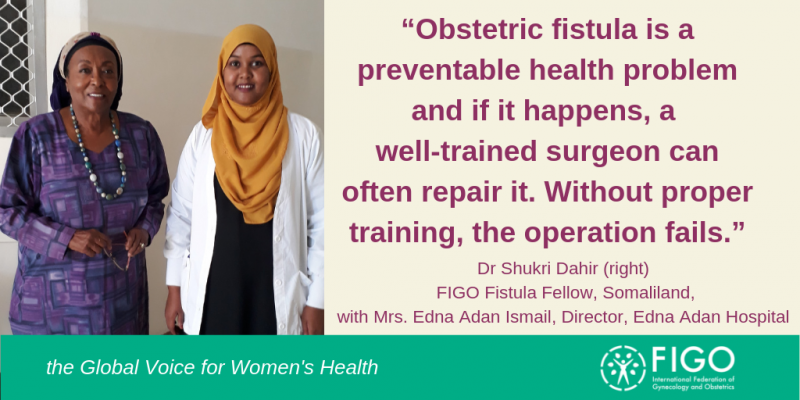
Obstetric fistula is a devastating childbirth injury, and a neglected public health and human rights issue.

2 million women in low-resource settings have an obstetric fistula, and up to 100,000 develop one every year. Leaking urine and / or faeces and living in despair on the margins of their own life, only 1 in 50 will ever receive treatment.
FIGO Fellows, trainee fistula surgeons from some of the world’s most underserved regions, are committed to closing this gap in care. Dr Shugri Dahir, from the Edna Adan Hospital in Somaliland, shares her story.
I want to share with you one of my most complex cases: Maryam Ismail, 50 years old and a mother of eight children.
Maryam got an obstetric fistula in 1989, and could no longer control her bladder. Because of the smell, she couldn’t attend events in her village. She missed the weddings of loved family and friends.
After one unsuccessful attempt at surgery she was told that her fistula was un-repairable – but that was not true.
Obstetric fistula is a preventable health problem and if it happens, a well-trained surgeon can often repair it. Without proper training, the operation fails. This makes the repeat operation more difficult and the chance for success even lower. I had another patient recently, Asiya, a 20-year old woman who was told after two failed surgeries, “You will never be continent. Deal with the incontinence.”

After we repaired her fistula at our centre, it took Asiya a while to accept that she could put her life back together. She had been living so far from society, in a place where no one could smell her. She felt reborn.
I think the international community does not see obstetric fistula as a health problem like maternal mortality. But patients with fistula who do not get health care die. They die, from complications that are both physical and psychological.
If I consider my own country, Somaliland, I will not see the end of fistula in my lifetime. The majority of women live in rural areas and deliver at home without skilled health personnel. Poor antenatal coverage makes it hard to predict which pregnancies will be high-risk, and travel to local health centres is difficult when there are sudden complications.
Training more doctors and nurses is essential to reduce the burden of obstetric fistula in Somaliland. Most women with fistula would prefer to have a female surgeon, but in my country there are only a few trained surgeons, and they are male.
I am the first trained female surgeon in my country, and I am so proud to be one of the 58 FIGO Fellows on the FIGO Fistula Surgery Training Initiative. I have had so much training opportunity to build my skills, which has allowed me to treat more patients – some of them have been suffering for 30 years.
After a complicated operation, Maryam woke up in a dry bed for the first time since 1989. She couldn’t finish a sentence she was so emotional. She couldn’t describe it in words, but she concluded – this surgery means the world for me.
Dr Shukri Dahir
FIGO Fistula Fellow
Somaliland

more recommended stories
 In New Geopolitical Play, Trump Eyes Somaliland to Block China and Defeat Houthi
In New Geopolitical Play, Trump Eyes Somaliland to Block China and Defeat HouthiHARGEISA – April 12, 2025 —.
 Somaliland Parliament: Any Consequences from PM’s Visit Are Somalia’s Responsibility
Somaliland Parliament: Any Consequences from PM’s Visit Are Somalia’s ResponsibilityHARGEISA, April 12, 2025 — The.
 From Berbera to Washington: Somaliland’s Strategic Pitch for U.S. Support
From Berbera to Washington: Somaliland’s Strategic Pitch for U.S. SupportIn a comprehensive interview with The.
 Somaliland to Defend Sovereignty Against Somalia’s Provocative Laascaanood Visit
Somaliland to Defend Sovereignty Against Somalia’s Provocative Laascaanood VisitThe Ministry of Foreign Affairs and.

